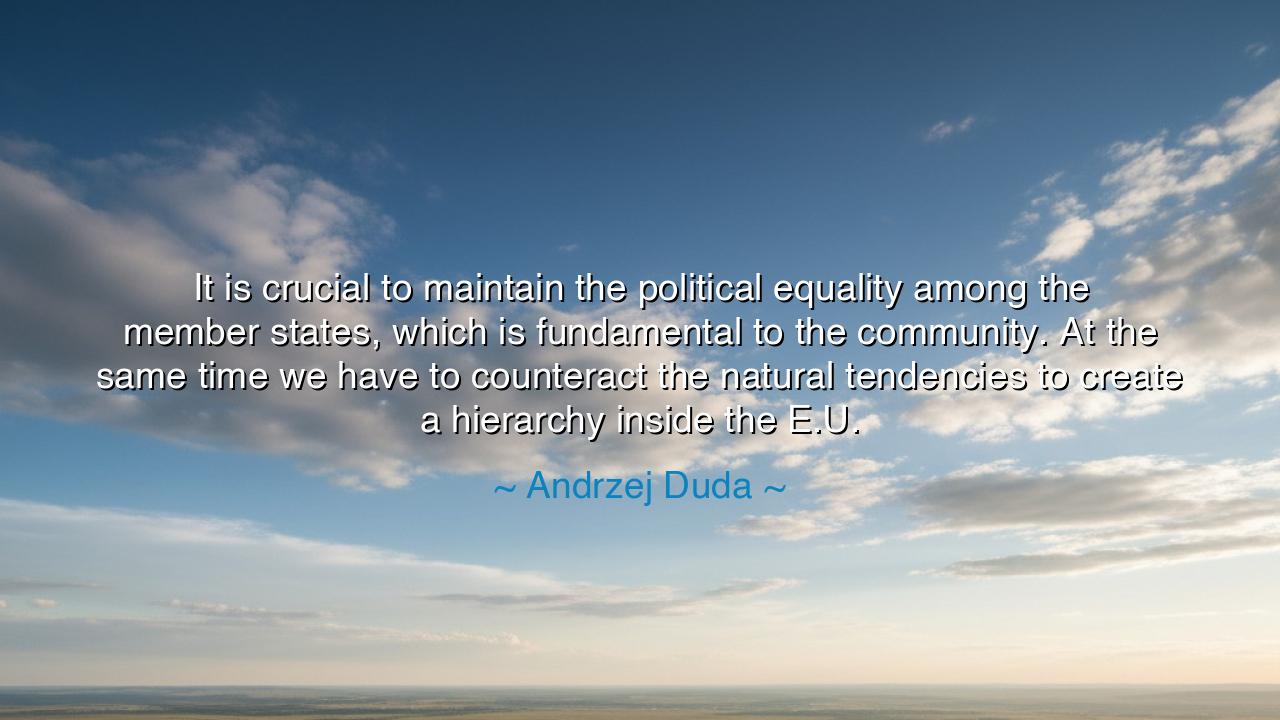
It is crucial to maintain the political equality among the member
It is crucial to maintain the political equality among the member states, which is fundamental to the community. At the same time we have to counteract the natural tendencies to create a hierarchy inside the E.U.






“It is crucial to maintain the political equality among the member states, which is fundamental to the community. At the same time we have to counteract the natural tendencies to create a hierarchy inside the E.U.” — Thus spoke Andrzej Duda, President of Poland, in the spirit of caution and conviction. His words are not merely a statement of political philosophy, but a defense of an ancient principle: that unity cannot exist without equality, and that no community, however vast or noble, can endure if power hardens into dominance. In this reflection, Duda gives voice to the eternal struggle between cooperation and control — the tension between the common good and the will to ascend.
To understand the meaning of this quote, one must look beyond the modern halls of the European Union and into the very roots of human governance. Every union — whether of cities, nations, or peoples — is born from the desire for peace and prosperity. Yet, as Duda reminds us, it also carries within it the seed of danger: the “natural tendency” toward hierarchy, the inclination of the strong to lead and the weak to follow. His warning is clear — that in the fellowship of nations, equality is not a gift bestowed once, but a constant effort, a living discipline that must be guarded lest it decay into dominance and resentment.
In invoking political equality, Duda speaks to the founding vision of the European Union — a continent that rose from the ashes of war to forge unity among equals. After centuries of conquest and rivalry, the nations of Europe swore that never again would might decide right. Yet as history has shown, even in peace, the shadow of hierarchy lingers. Wealth, population, and influence threaten to tilt the balance, to make some voices thunder while others fade. Duda’s call, then, is not to abandon leadership, but to temper it with humility — to remember that the greatness of a union lies not in its strongest members, but in its ability to lift all equally.
The origin of this principle reaches back to the wisdom of the ancients. The Greek city-states, though united by culture and language, were often divided by pride. Athens, in her might, sought to rule; Sparta, in her discipline, sought to dominate. Their wars destroyed the harmony they might have shared. Centuries later, the Roman Republic too began as a union of equals — citizens bound by law, not by lineage. But as Rome grew, equality gave way to empire, and the republic’s spirit was lost beneath the weight of hierarchy. In Duda’s words, we hear the echo of these ancient lessons — that the fall of every great community begins not with invasion from without, but with inequality from within.
Consider also the Polish-Lithuanian Commonwealth, once a beacon of democracy in Europe’s medieval age. It was founded on a noble idea — that kings and nobles alike were bound by the law of the land, that one’s voice in the Sejm (the parliament) mattered as much as another’s. Yet over time, factionalism and imbalance eroded that equality. The few came to control the many, and the state that once embodied freedom fell to partition and conquest. History, it seems, is a mirror forever reflecting the same truth: equality is fragile, and where hierarchy grows unchecked, community fades.
Duda’s warning about the European Union is thus a modern echo of an ancient pattern. For even in noble enterprises, ambition is never absent. Larger nations, with greater economies and louder influence, may seek to shape decisions to their own image, forgetting that unity cannot be built upon the submission of the small. True partnership requires not dominance, but respect, not hierarchy, but harmony. Just as a choir is diminished when one voice overwhelms the rest, so too is a union diminished when equality is lost.
And so, O listener, take from these words a lesson that extends beyond nations — into the very heart of human relations. Whether among states, communities, or souls, equality is the foundation of peace. Guard against pride that seeks to rise above others, for leadership without humility becomes tyranny. When you stand among peers, remember that cooperation is not the silence of the weak, but the wisdom of the strong. Lift others as you rise; listen as you speak; share as you lead. For the greatness of any union — be it the European Union, a friendship, or a family — depends not on the strength of one, but on the fairness of all.
Thus, the words of Andrzej Duda echo across ages: to counteract hierarchy is not to deny difference, but to protect dignity; to preserve equality is to preserve the soul of the community itself. When every member, great and small, is heard and honored, then the union endures — radiant, balanced, and whole, a living testament to the highest order of human cooperation.






AAdministratorAdministrator
Welcome, honored guests. Please leave a comment, we will respond soon